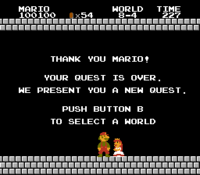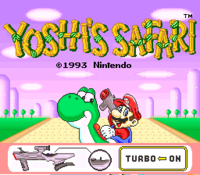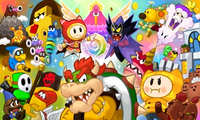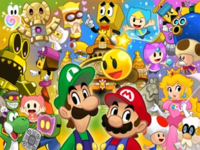Hard Mode
| It has been suggested that Challenge (New Super Mario Bros.) be merged into this page. (discuss) |
Hard Mode featured in the Super Mario franchise increases the difficulty level of the game. This option changes certain elements of the game to reflect the difficulty, such as increasing the enemy's strength.
History
This section is a stub. Please consider expanding it to include any missing information. Specifics: Information on the Wario's Woods (Super Nintendo Entertainment System) (unnamed?) secret hard mode
Super Mario series
Super Mario Bros.
- “Thank you Mario! Your quest is over. We present you a new quest. Push button B to select a world”
- —Princess Toadstool
After completing the main game in Super Mario Bros., the player is given the option to pick a world to play in "a new quest." At the title screen, the player can choose which world to start at by pressing (which changes the world counter in the upper right on the title screen for each press) before beginning Hard Mode. In this mode:
- All Little Goombas are replaced by Buzzy Beetles.
- Little Goombas, Koopa Troopas who start on the ground, and Buzzy Beetles move faster.
- It takes a shorter amount of time for Koopa Troopas and Buzzy Beetles to emerge from their shells.
- The elevator-style lifts all use the short style, even in levels where the long style was used. Levels affected by this include Worlds 1-2, 3-3, 4-2, and 4-3.
- Hammer Bros wait a shorter amount of time before walking towards the player.
- Worlds 1-3, 1-4, 2-2, 2-3, and 2-4 are exact clones of their harder counterparts, which are Worlds 5-3, 6-4, 7-2, 7-3, and 5-4 respectively.
The player still has the same amount of time to complete each level. Mario and Luigi gain no special powers in Hard Mode, and they receive no extra points when they defeat an enemy. There is no reward for finishing the game in Hard Mode, and any subsequent playthroughs of the game will start over in this mode. In the Family Computer Disk System port, Hard Mode is also enabled after beating the Minus World, which is only possible in that version.
Hard Mode does not appear in VS. Super Mario Bros.
Hard Mode is also found in All Night Nippon: Super Mario Bros. but there is no world select option, the game restarts at 1-1. Beating 8-4 again will add another star to the title screen, which can also be achieved by beating the game normally. The changes are also applied to Worlds A-D in this game.
In the Super Mario All-Stars version of Super Mario Bros.: The Lost Levels, beating the first eight worlds without warps and finishing World 9 activates Hard Mode for Worlds A-D, like in Super Mario Bros. If the first eight worlds are beaten with warps and the player heads directly to World A, Hard Mode will not be active. However, there is a glitch that activates Hard Mode when the player saves and quits and reenters the level.
In Super Mario All-Stars and Super Mario Bros. Deluxe, Hard Mode, referred to as "Star courses" in the latter game, becomes an actual second quest that the player must go through in order to fully complete the game. The text about pushing B to select a world is removed as the level select feature was redone for these games. These games use a star to indicate the mode, with All-Stars placing it before the level number (e.g. "World ★1-1") and Deluxe placing it where the hyphen would normally go ("World 1★1"). Beating the Star courses in Deluxe rewards the player with the text "Wow! You are a super player! Congratulations!" from Princess Toadstool as well as the Bowser Award in their photo album.
In the Classic NES Series port of Super Mario Bros., Hard Mode and world select along with the current high score can be saved for future playthroughs by selecting "Save High Score" in the menu (accessed by pressing L and R together).
Hard Mode is available in Super Luigi Bros. and Speed Mario Bros.
In Game & Watch: Super Mario Bros., Hard Mode can be selected by pressing left and right on the Super Mario Bros. title screen after clearing the game once.
Super Mario Land
Expert Level[1] in Super Mario Land is unlocked after completing the main game, indicated by Mario's head replacing the mushroom on the title screen. In this mode, more enemies appear in every level, and completing it unlocks a level select option.
Super Mario Advance 4: Super Mario Bros. 3
Hard Mode in this game can be activated by using the "Teki Power Up! Tokuten x2!!" Switch Card. In this mode:
- All Goombas are replaced with Spinies, all Koopa Troopas are replaced with Buzzy Beetles, and all Piranha Plants are replaced with Fire Piranha Plants. This does not affect Paragoombas and Koopa Paratroopas, nor does it affect Big Goombas, Big Koopa Troopas, or Big Piranha Plants.
- All bosses have double health.
- The damage system is similar to the Famicom version of Super Mario Bros. 3. Any damage taken by Mario when he has a power-up will power him down to Small Mario. However, unlike the Famicom version, collecting a Super Leaf or Fire Flower as Small Mario will give Mario the power-up instead of causing him to become Super Mario. Also, if Mario is hit while in Goomba's Shoe, he only loses the shoe instead of also losing all power-ups.
- In exchange for this difficulty increase, all points Mario gets are doubled. As the N-Mark Spade Panel appears based on points gained, this effect causes it to appear twice as often, giving Mario more chances to obtain Super Mushrooms, Fire Flowers, Super Stars, extra lives, and coins.
Like the effects of the other Switch Cards, these changes can be deactivated by scanning the card again. The game must be saved after scanning the card to save the activation or deactivation of its effects.
Yoshi's Safari
- “Congratulations! I know a secret. Press the L, R, X, Y & Start Buttons simultaneously on the Title Screen for a new quest!”
- —Yoshi
Hard Mode in Yoshi's Safari can be played by holding ,
,
,
and pressing
at the title screen. In this mode, there are several changes:
- Dialogue is slightly altered, where Bowser and the Koopalings kidnap King Fret and Prince Pine again and recapture the twelve Gems of Jewelry Land.
- Coloration for the title screen, map screens for Light Realm and Dark Realm, and courses have changed.
- Enemy placement has been tweaked for courses: some enemies may replace others at certain points, some enemies that appeared in one path may appear in the other, and there are more enemies in general.
- Bosses and enemy projectiles move much faster.
- Time limits for each course are reduced by one minute (excluding Cornice Cave and Dark Sea).
- The player earns twice as many points than they do in normal mode.
Virtual Boy Wario Land
After beating Virtual Boy Wario Land while collecting all the treasures, the save file in the file select screen will have the bat carrying the file's sign replaced with two fairies. Playing the save file again will allow the player to engage in a harder version of a game. This harder version includes a larger amount of Spike Traps in levels, different designs for the ten treasures, and different endings upon completion.
Luigi's Mansion
- “Don't get scared stiff, Luigi!”
- —Professor E. Gadd
After completing the main game for the first time in Luigi's Mansion, the quest can be restarted in the normal mansion or the "Hidden Mansion". In this mode, the Poltergust 3000 has 1.5× more power, making it easier for the player to capture regular ghosts and Portrait Ghosts; Luigi takes twice as much damage, his Flashlight freezes ghosts in half the time in the regular mansion, and Hearts are more difficult to find and are smaller than usual. A gold star appears on the bottom right-corner of the screen when playing in the Hidden Mansion. The player can switch between the regular mansion and the Hidden Mansion anytime they speak to Professor E. Gadd. There is no reward for completing the Hidden Mansion.
In the PAL version, the mansion is flipped left-to-right, and the ghost placement is vastly different. The Boolossus fight is also completely different, with Luigi riding the Poltergust as though it was a car. Also solely in this version, the A-rank mansion can only be obtained on this mode, as the normal mode lacks enough treasure.
The 3DS remake of the Hidden Mansion is changed in all versions. All of the ghosts, portrait ghosts, and Boos have 1.5x their original HP amount; the Speedy Spirits' and Mario's items' locations (except for Mario's Star) have been changed; hearts are replaced by Poison Mushrooms (however, the player can still get hearts by defeating two or more ghosts at once); and more ghost mice and ghost fish appear in certain dark rooms. Bogmire and Bowser are also more difficult: Bogmire can disappear and reappear at another spot every few seconds, and Bowser's spike bombs explode upon his first throw (though they may not in his second and third throws). Chauncey retains the same battle effects from the original PAL version, while Boolossus's battle is the same as in the original mansion.
Mario & Luigi series
Mario & Luigi: Dream Team
- “This mode is INTENSE. Seriously. The enemies are tougher, and you can't start over when you lose in battle. Plus, you can only carry up to 10 of each item!”
- —In-game text, Mario & Luigi: Dream Team
In Mario & Luigi: Dream Team, Hard Mode is unlocked when the player completes the game on a file at least once.
When unlocked, an orange button with "START OVER IN HARD MODE" is shown on the file select screen at the bottom of the touch screen, which allows the player to start a new game file on Hard Mode. When selected, the player is given an option to choose which file will be chosen for Hard Mode; once the player creates a file on Hard Mode, it cannot be changed back to a normal file unless the player erases the file. A Hard Mode file has an orange label with "HARD" displayed on it.
In the Hard Mode, enemies and bosses have a great boost in POW, allowing them to deal a lot more damage to the Bros. than usual (i.e. a Gromba can deal 14 points of damage to Mario at initial stats instead of 3[2]), while still receiving the same amount in return. The timing on solo Jump and Hammer attacks is stricter, and the Bros. can only carry up to ten of each given item available (wearing the Bottomless Gloves lifts this restriction in battles). In addition, there is no option to retry a battle after losing; the game will instead revert back to the title screen upon Game Over, similar to the previous Mario & Luigi games, and thus makes Easy Mode forbidden. Giant Bosses have different attack patterns than on a normal file, and the recommended levels for facing bosses in the Battle Ring have increased by five. Upon beating the final boss in Hard Mode, before the credits start, a two-screened image of Bowser, Kamek and the Elite Trio on the Koopa Clown Car along with Mario and Luigi standing in the coin shower can be seen, and after the credits the player gets to view a two-screened image featuring all the main characters and main bosses in the game.
Mario & Luigi: Paper Jam
In Mario & Luigi: Paper Jam, Hard Mode is exclusive to quests. When a quest is cleared in Normal Mode, Hard Mode is unlocked. Hard Mode raises the difficulty of quests by decreasing the mistake limit or time limit, making Paper Toads harder to catch, or speeding up the Yoshis in Yoshi races. Clearing a quest in Hard Mode gives the player an extra Medal.
Donkey Kong Country: Tropical Freeze
Hard Mode is unlocked in Donkey Kong Country: Tropical Freeze replacing Mirror Mode from the previous game after the player completes every single level in the game. When playing on Hard Mode, the player can select any of the four Kongs (five if playing the Nintendo Switch version's Funky Mode), but will only have one heart and cannot use any items in their inventory. Checkpoints will also not appear in the stage, and while DK Barrels will, they can only be used as projectiles. Upon completing a stage in Hard Mode, it will be marked green on the world map.
Hard Mode also includes blue versions of the KONG Letters; collecting them all is not necessary for 200% completion, but it will turn the star icon blue. In the Switch port, these variants do not need to be collected in one go if Funky Mode is turned on, much like their orange counterparts.
Mario + Rabbids Sparks of Hope
In Mario + Rabbids Sparks of Hope, the player is able to choose their difficulty setting after the tutorial battles. One of them is Demanding, which is the hardest difficulty. This will increase the enemy's health and strength and make it harder for heroes to defeat them.
See also
Names in other languages
| Language | Name | Meaning | Notes |
|---|---|---|---|
| Japanese | 超キケン! (Mario + Rabbids Sparks of Hope)[?] Chō kiken! |
Super dangerous! |
References
- ^ Campbell, Stuart (May 5, 1999). Game Boy Game Secrets, 1999 Edition Prima's Official Strategy Guide. Prima Games (American English). ISBN 0-7615-2085-6. Page 92.
- ^ MLmaster135 (August 19, 2013). Mario & Luigi Dream Team(Hard Mode):Grombas on Hard Mode are Ridiculously Powerful. YouTube (English). Retrieved June 3, 2024.



